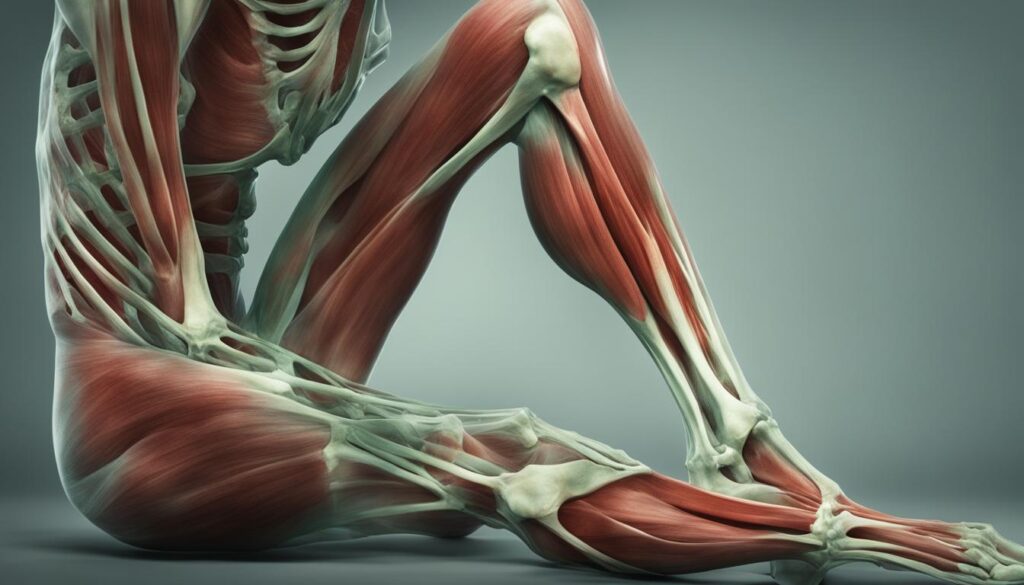Muscle cramps can be frustrating and painful, especially if they occur frequently. But have you ever wondered what deficiency might be causing those muscle cramps? In this article, I will explore the various nutrient deficiencies that have been linked to muscle cramps and discuss how addressing these deficiencies can help alleviate this uncomfortable condition.
Deficiencies in certain nutrients can disrupt the delicate balance of our body’s functions, leading to a range of symptoms and complications. Identifying the specific deficiencies that may be triggering your muscle cramps is crucial in developing an effective strategy to address them.
Key Takeaways:
- Several nutrient deficiencies can cause muscle cramps.
- Deficiencies in calcium, vitamin D, potassium, iron, vitamin B12, folate, magnesium, and potentially choline have been linked to muscle cramps.
- Meeting daily nutrient requirements through a balanced diet or supplements is essential to prevent deficiencies and alleviate muscle cramps.
- Consulting with healthcare professionals can help identify and address nutrient deficiencies for optimal health.
- Adequate intake of these nutrients can help prevent muscle cramps and promote overall well-being.
Calcium Deficiency and Muscle Cramps
Calcium is an essential mineral that plays a crucial role in muscle and nerve function. A deficiency in calcium can lead to various symptoms, including muscle cramps. When calcium levels are low, the muscles may not contract and relax properly, resulting in cramps and spasms.
One common symptom of calcium deficiency is numbness or tingling in the fingers. This occurs because calcium is necessary for proper nerve signaling. When calcium levels are inadequate, the nerves may not function properly, leading to abnormal sensations like numbness.
Additionally, severe calcium deficiency can cause irregular heart rhythms, which can further contribute to muscle cramps. The heart relies on calcium to maintain its regular rhythm, and when calcium levels are low, the heart may experience disruptions in its electrical signals.
To prevent calcium deficiency and muscle cramps, it is important to ensure an adequate intake of calcium through diet or supplements. Good dietary sources of calcium include dairy products, leafy greens, and fortified foods. Incorporating these calcium-rich foods into your diet can help maintain proper calcium levels and reduce the risk of muscle cramps.
Table: Calcium-Rich Foods
| Food | Calcium Content (per serving) |
|---|---|
| Milk | 300 mg |
| Yogurt | 250 mg |
| Cheese | 200-300 mg |
| Sardines (canned, with bones) | 300 mg |
| Tofu (calcium-set) | 200 mg |
| Kale | 100 mg |
“Maintaining adequate calcium levels is crucial for preventing muscle cramps. Incorporating calcium-rich foods like milk, yogurt, and leafy greens into your diet can help ensure a sufficient intake of this essential mineral.”
Vitamin D Deficiency and Muscle Cramps
Vitamin D is an essential nutrient that plays a crucial role in bone health and muscle function. Deficiency in vitamin D can lead to a range of symptoms, including fatigue, bone pain, mood changes, and muscle weakness. These symptoms may contribute to the occurrence of muscle cramps.
One of the primary functions of vitamin D is to promote calcium absorption in the intestines and regulate calcium levels in the body. Adequate calcium is essential for proper muscle contraction and nerve function. When there is a deficiency of vitamin D, the body may experience difficulties in maintaining normal calcium levels, which can result in muscle cramps.
Exposure to sunlight is an important source of vitamin D synthesis in the body. However, certain factors, such as limited sun exposure, dark skin tone, and geographical location, can contribute to vitamin D deficiency. In addition to sunlight, dietary sources of vitamin D include fatty fish, fortified dairy products, and egg yolks. Supplementation may also be necessary in cases of severe deficiency.
Prevention and Management of Vitamin D Deficiency
To prevent vitamin D deficiency and alleviate the associated muscle cramps, it is important to ensure adequate vitamin D intake. This can be achieved through a combination of sunlight exposure and diet. Spending time outdoors in the sun, particularly during the midday hours, can help boost vitamin D synthesis in the skin.
Additionally, incorporating vitamin D-rich foods into your diet can contribute to maintaining optimal levels. Some examples of foods high in vitamin D include fatty fish like salmon and mackerel, fortified dairy products, and fortified cereals. If dietary sources are insufficient, consult with a healthcare professional about vitamin D supplementation.
Regular monitoring of vitamin D levels through blood tests can help identify deficiencies and guide appropriate supplementation or lifestyle changes. By addressing vitamin D deficiency and ensuring adequate intake, individuals may reduce the frequency and severity of muscle cramps.
| Signs and Symptoms of Vitamin D Deficiency | Prevention and Management |
|---|---|
| Fatigue | Ensure adequate sunlight exposure and consume vitamin D-rich foods or supplements |
| Bone pain | Spending time outdoors in the sun and incorporating fortified dairy products into the diet |
| Mood changes | Incorporate fatty fish like salmon into the diet and consider vitamin D supplementation if necessary |
| Muscle weakness | Regular monitoring of vitamin D levels and consultation with a healthcare professional for appropriate supplementation |
Potassium Deficiency and Muscle Cramps
Potassium is an essential mineral that plays a critical role in muscle function and nerve transmission. A deficiency in potassium can disrupt these processes, leading to muscle weakness and cramps. When potassium levels are inadequate, the muscles are unable to properly contract and relax, resulting in painful cramps. If you frequently experience muscle cramps, it is important to consider the possibility of potassium deficiency.
To prevent potassium deficiency and alleviate muscle cramps, it is crucial to incorporate potassium-rich foods into your diet. Bananas, sweet potatoes, spinach, avocados, and beans are excellent sources of potassium. Consuming these foods regularly can help ensure that your body maintains optimal potassium levels, reducing the risk of muscle cramps.
In situations where dietary changes alone are not sufficient, potassium supplements may be recommended by healthcare professionals to address deficiency. However, it is important to consult with a healthcare provider before starting any supplements to ensure proper dosage and avoid potential side effects.
Signs of Potassium Deficiency
- Muscle weakness and cramps
- Fatigue and low energy levels
- Irregular heart rhythms
- Numbness or tingling sensations
If you experience these symptoms, it is important to consult with a healthcare professional for an accurate diagnosis and appropriate treatment. They can help determine if potassium deficiency is the underlying cause of your muscle cramps and recommend the most effective course of action.
Iron Deficiency and Muscle Cramps
Iron plays a vital role in the production of red blood cells and the transportation of oxygen throughout the body. When there is an insufficient amount of iron in the body, it can lead to iron deficiency anemia. This condition can cause a range of symptoms, including fatigue, weakness, shortness of breath, and muscle cramps.
A study published in the Journal of Nutrition found that iron deficiency can directly contribute to muscle cramps. The researchers noted that iron is involved in muscle metabolism and the regulation of muscle oxygenation, which are crucial for optimal muscle function and contraction. When iron levels are low, muscle cells may not receive enough oxygen, leading to cramping and discomfort.
Iron is essential for muscle metabolism and oxygenation, and its deficiency may contribute to muscle cramps.
To prevent iron deficiency and alleviate muscle cramps, it is important to consume iron-rich foods. Some excellent dietary sources of iron include lean red meat, poultry, seafood, beans, lentils, spinach, and fortified cereals. It is also recommended to combine iron-rich foods with foods high in vitamin C, such as citrus fruits, bell peppers, and broccoli, as vitamin C enhances iron absorption.
| Food Source | Iron Content (mg per serving) |
|---|---|
| Lean red meat (beef, lamb) | 2.5-3.5 |
| Poultry (chicken, turkey) | 1-1.5 |
| Seafood (oysters, clams) | 3-5 |
| Beans (kidney beans, chickpeas) | 2-4 |
| Lentils | 2.5 |
| Spinach | 2 |
| Fortified cereals | varies; check nutrition labels |
In addition to dietary changes, iron supplements may be prescribed by a healthcare professional if iron deficiency persists or if dietary intake is not sufficient. It is important to consult with a healthcare professional for proper diagnosis, monitoring, and guidance on iron supplementation.
Vitamin B12 Deficiency and Muscle Cramps
Vitamin B12 is an essential nutrient for red blood cell production and nerve function. A deficiency in vitamin B12 can lead to various symptoms, including numbness, fatigue, and muscle weakness. When the body lacks an adequate supply of vitamin B12, it can affect the proper functioning of nerves, leading to muscle cramps and other related discomforts.
To prevent vitamin B12 deficiency and alleviate muscle cramps, it is important to ensure an adequate intake of this nutrient. Foods rich in vitamin B12 include fish, chicken, dairy products, and fortified cereals. Additionally, vitamin B12 supplements may be recommended for individuals at risk of deficiency, such as older adults or individuals with certain medical conditions that hinder the absorption of this essential nutrient.
While muscle cramps can be uncomfortable and disruptive, addressing underlying nutrient deficiencies, such as vitamin B12 deficiency, can help manage and prevent these symptoms. It is important to consult with a healthcare professional, who can assess your specific needs and provide appropriate recommendations for a balanced diet, including vitamin B12-rich foods and supplements, to support overall health and well-being.
Ensuring adequate levels of vitamin B12 is crucial for maintaining optimal nerve and muscle function. By understanding the connection between vitamin B12 deficiency and muscle cramps, individuals can make informed choices to support their health and prevent discomfort. Remember to consult with a healthcare professional for personalized advice and guidance.
Folate Deficiency and Muscle Cramps
Folate, also known as folic acid, is an essential nutrient that plays a crucial role in cell growth and function. It is especially important during periods of rapid growth, such as pregnancy and infancy. Folate deficiency can result in various health issues, including muscle cramps.
One of the key symptoms of folate deficiency is fatigue. This can be attributed to the role folate plays in energy production within the body. When folate levels are low, the body may struggle to produce energy efficiently, leading to feelings of tiredness and muscle weakness. Fatigue can contribute to the occurrence of muscle cramps.
To prevent folate deficiency and the associated muscle cramps, it is important to include folate-rich foods in your diet. Good dietary sources of folate include fortified cereals, legumes, dark leafy greens like spinach, and citrus fruits. Additionally, folic acid supplements may be recommended by healthcare professionals in cases of severe deficiency.
Table: Foods Rich in Folate
| Food | Folate Content (mcg) |
|---|---|
| Spinach (1 cup, cooked) | 263 |
| Lentils (1 cup, cooked) | 358 |
| Black-eyed peas (1 cup, cooked) | 358 |
| Asparagus (1 cup, cooked) | 268 |
| Oranges (1 medium) | 50 |
Incorporating these folate-rich foods into your diet can help ensure you are meeting your body’s folate needs and reduce the risk of muscle cramps associated with folate deficiency. However, it is important to consult with a healthcare professional if you suspect you have a folate deficiency to determine the best course of action.

“Folate deficiency can lead to fatigue and muscle weakness, which may contribute to the occurrence of muscle cramps.”
Magnesium Deficiency and Muscle Cramps
Muscle cramps can also be triggered by magnesium deficiency. Magnesium is a vital mineral that plays a crucial role in muscle contraction and energy production. When magnesium levels are low, it can lead to a range of symptoms, including muscle cramps, loss of appetite, fatigue, and weakness. It is important to ensure an adequate intake of magnesium to prevent deficiency and alleviate muscle cramps.
There are various dietary sources of magnesium that can help maintain optimal levels in the body. These include nuts, seeds, leafy greens, whole grains, and legumes. Incorporating these foods into your diet can help prevent magnesium deficiency and reduce the risk of muscle cramps.
“Magnesium, along with other nutrients, plays a critical role in muscle health. Deficiency in this mineral can disrupt the balance of electrolytes in the body and lead to muscle cramps. It is important to pay attention to your magnesium intake and consider supplementation if necessary.”
However, it is worth noting that excessive magnesium intake can also have adverse effects. Therefore, it is recommended to consult with a healthcare professional to determine the appropriate magnesium intake for your specific needs.
| Magnesium-Rich Foods | Magnesium Content (per 100g) |
|---|---|
| Almonds | 270mg |
| Pumpkin Seeds | 262mg |
| Spinach | 79mg |
| Black Beans | 60mg |
As shown in the table, incorporating magnesium-rich foods like almonds, pumpkin seeds, spinach, and black beans into your meals can help boost your magnesium intake and reduce the risk of muscle cramps.
Choline Deficiency and Muscle Cramps
Choline is an essential nutrient that plays a crucial role in various aspects of muscle physiology, including muscle contraction and intracellular calcium regulation. Although less studied compared to other nutrient deficiencies, choline deficiency may contribute to the occurrence of muscle cramps. Research suggests that choline is involved in the metabolism of acetylcholine, a neurotransmitter necessary for muscle activation and contraction.
Adequate choline levels are necessary for optimal muscle function. However, choline deficiency can result in impaired muscle metabolism, leading to muscle cramps. While the exact mechanisms linking choline deficiency to muscle cramps are not fully understood, it is believed that the disruption of acetylcholine synthesis and utilization may play a role.
To ensure sufficient choline intake and prevent choline deficiency, it is important to include choline-rich foods in your diet. Good dietary sources of choline include eggs, liver, beef, poultry, and fish. If necessary, choline supplements can also be taken, but it is always advisable to consult with a healthcare professional before starting any supplementation.

Summary:
- Choline is an essential nutrient involved in muscle contraction and intracellular calcium regulation.
- Choline deficiency may contribute to muscle cramps due to its role in acetylcholine metabolism.
- Including choline-rich foods in the diet or taking choline supplements can help prevent choline deficiency.
Conclusion
In conclusion, muscle cramps can be caused by various nutrient deficiencies, which can lead to a range of symptoms and complications. It is crucial to identify and address these deficiencies in order to effectively prevent and alleviate muscle cramps.
Some of the key nutrients that play a significant role in muscle function and the prevention of muscle cramps include calcium, vitamin D, potassium, iron, vitamin B12, folate, magnesium, and potentially choline. Adequate intake of these nutrients through a well-balanced diet or supplements is essential.
By meeting the daily requirements of these nutrients, individuals can help prevent nutrient imbalances that can contribute to muscle cramps. Ensuring adequate calcium and vitamin D intake for strong muscles and bones, consuming potassium-rich foods for proper muscle and nerve function, and consuming iron-rich foods for oxygenation of muscles are some of the key steps to take.
Consulting with healthcare professionals can provide guidance on addressing nutrient deficiencies and optimizing overall health. By taking a proactive approach to meeting nutrient needs, individuals can reduce the risk of muscle cramps and enjoy better muscle function and overall well-being.
FAQ
What deficiency causes muscle cramps?
Muscle cramps can be caused by several nutrient deficiencies, including calcium, vitamin D, potassium, iron, vitamin B12, folate, magnesium, and potentially choline.
How does calcium deficiency contribute to muscle cramps?
Calcium is essential for muscle and nerve function. Severe calcium deficiency can cause symptoms like numb, tingling fingers and abnormal heart rhythms.
What are the symptoms of vitamin D deficiency that can cause muscle cramps?
Vitamin D deficiency can lead to symptoms like fatigue, bone pain, mood changes, and muscle weakness.
How does potassium deficiency result in muscle cramps?
Potassium is involved in muscle and nerve function. Low potassium levels can result in muscle weakness, cramps, and irregular heart rhythms.
How does iron deficiency contribute to muscle cramps?
Iron is necessary for red blood cell production and oxygenation of muscles. Anemia, which can be caused by iron deficiency, can lead to symptoms like fatigue, shortness of breath, and muscle weakness.
What are the symptoms of vitamin B12 deficiency that can cause muscle cramps?
Vitamin B12 deficiency can cause symptoms like numbness, fatigue, and muscle weakness.
What are the symptoms of folate deficiency that can lead to muscle cramps?
Folate deficiency can lead to symptoms like fatigue, diarrhea, and muscle weakness.
How does magnesium deficiency contribute to muscle cramps?
Magnesium plays a role in muscle contraction and energy production. Low magnesium levels can result in symptoms like loss of appetite, fatigue, and muscle cramps.
Is there a link between choline deficiency and muscle cramps?
Further research is needed to fully understand the link between choline deficiency and muscle cramps.
How can nutrient deficiencies be prevented to alleviate muscle cramps?
Adequate intake of calcium, vitamin D, potassium, iron, vitamin B12, folate, magnesium, and potentially choline through a balanced diet or supplements can help prevent deficiency and alleviate muscle cramps.




